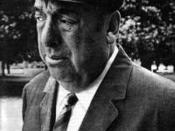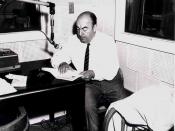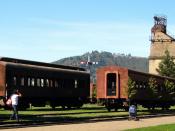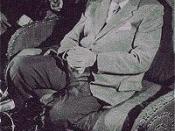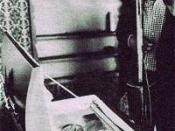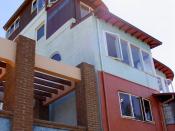Memoirs by Pablo Neruda The book Memoirs written by Pablo Neruda is about his personal life. The book starts with chapter one which is called "The Country Boy."� In chapter one Neruda describes where he was raised as a child in the poem called the "The Chilean Forest."� Neruda paints a very descriptive picture to the reader about walking through the forest and taking in all of the surroundings that is stimulating to the senses. From the description of the snowcapped mountains to the vertical enormity of the trees, and the wildlife within the forest, the poem is very calming to the reader.
Neruda then goes into growing up in the town of Temuco, a pioneering town in the southern part of the Chilean territory. The town of Temuco is close to the volcano Mt. Llaima which is active. Though Neruda was living in the town of Temuco, he was born in the town of Parral, which is where his parents originated from.
His mother died when he was very young, which does not give him memories of here. Neruda's father was a conductor on a ballast train.
Neruda starts describing is episodes which start at a very young age. The first one that is noted is his search for bugs and the man called Monge who according to his father was a dangerous man with a knife. Neruda also describes how he started writing poetry and had a passion for it. The first incident was when he wrote poetry for a fellow classmate to win the heart of a school girl named Blanca Wilson. Blanca Wilson found out that Neruda actually wrote the poems and gave her heart to Neruda. This incident brought the onset of his poetry.
Neruda's next chapter "Lost in the City"� describes Neruda going to college in Santiago and joining the review called the Claridad, which more or less was a political paper. In this chapter Neruda also describes living in Madrid, Spain during World War II. Neruda describes how the Nazis ravaged Spain and killed or imprisoned many. Most notable about one of the imprisoned was a person by the name of Alvaro Guevara, a painter that had an idea called Columbus's potato, which Alvaro thought was the answer to humanity. In this chapter Neruda also tells of the first book he wrote in 1923 called "Crepusculario"� which was a hard book to get published.
Neruda also talks of other incidents throughout the book such as, Rango the orangutan who would share a beer with Neruda, to his possessive Burmese lover who used the name Josie Bliss in public, wearing her secret Burmese name only in the privacy of their home, and to the servant he brings along to his next postings to care for his pet mongoose, Kiria.
Neruda talks of his appointments to consul in Rangoon, then Colombo, Batavia, and finally Singapore. Neruda was not kept very busy by his diplomatic duties but did manage to see much of the world. During his appointment to consul in Spain 1934, he became politically more involved with the outbreak of the Civil War there. Dismissed from his post in 1936 he nevertheless remained politically active.
Throughout the book Neruda seems to be having a great time traveling and meeting strange and interesting people. Another noteworthy scene described by Neruda, is during the chapter "Luminous Solitude"� which Neruda describes the Moslem fire-walkers and the scene it creates.
Neruda devotes some space to the poems he authored, but rarely is there more than a paragraph about any particular collection. He always comes across as a writer, but considerations of the actual output are kept at a minimum, the poetry presented as if it were incidental. Similarly, Neruda does not go on at much length about the works of other authors, focusing on personalities and experiences rather than the written records.
Throughout the book there is relatively little anger. Neruda comes across as genial and forgiving (with a few exceptions), frustrated especially by Chilean politics that is described in the chapter "Cruel, Beloved Homeland."� In this chapter Neruda talks of offer to run for the Presidency of Chile. The political party he belonged to was the Communist party. Neruda would only accept the nomination on conditions of support from other parties. The book ends in this chapter, which it is describing the murder of President Allende, who could be called a reformist for the Chilean people. Allende recovered a sense of national pride for the Chilean people, by taking back the wealth of Chile's topsoil: copper. Allende was killed by a machine gun and his body was secretly buried. The book also has a chronology of events
